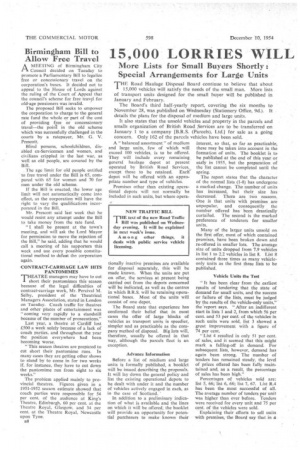Birmingham Bill to Allow Free Travel
Page 42

If you've noticed an error in this article please click here to report it so we can fix it.
A MEETING of Birmingham City t-k Council decided on Tuesday to promote a Parliamentary Bill to legalize free or concessionary travel on the corporation's buses. It decided not to appeal to the House of Lords against the ruling of the Court of Appeal that the council's scheme for free trav91 for old-age pensioners was invalid.
The proposed Bill seeks to empower the corporation to charge to the general rate fund the whole or part of the cost of providing free or concessionary travel—the poinel in the old scheme which was successfully challenged in the courts by a ratepayer, Mr. G. V. Prescott.
Blind persons, schoolchildren, disabled ex-Servicemen and women, and civilians crippled in the last war, as well as old people, are covered by the Bill.
The age limit for old people entitled to free travel under the Bill is 65, compared with 65 for women and 70 for men under the old scheme.
If the Bill is enacted, the lower age limit will not automatically come into effect, as the corporation will have the right to vary the qualifications incor porated in the Bill. .
Mr, Prescott said last week that he would resist any attempt under the Bill to take money from the rate fund, "1 shall be present at the town's meeting, and will ask the Lord Mayor for permission to move the rejection of the Bill," he said, adding that he would call a meeting of his supporters this week and use every possible constitutional method to defeat the corporation again.
-CONTRACT-CARRIAGE LAW HITS PANTOMIMES 'THEATRE managers may have to cut
short their pantomimes this -season because of the legal difficulties of contract-carriage work, Mr. Percival M. Selby, president of the Theatrical Managers Association, stated in London on Tuesday. Coach traffic for theatres and other places of entertainment was "coming very rapidly to a standstill because of the number of prosecutions,"
Last year, a theatre at Cardiff lost £500 a week solely because of a lack of coach parties, and throughout the year the position everywhere had been becoming worse.
"This season theatres are prepared to cut short their pantomime runs. In many cases they are getting other shows to stand by to come in for two weeks if, for instance, they have to cut down the pantomime run from eight to six weeks."
The problem applied mainly to provincial theatres. Figures given in a 1951-1952 season estimate showed that coach parties were responsible for 54 per cent, of the audience at King's Theatre, Edinburgh, 60 per cent, at the Theatre Royal, Glasgow, and 34 per cent. at the Theatre Royal, Newcastle upon Tyne.
a8 tionally inactive Premises are available for disposal separately, this will be made known. When the units are put on offer, the services at present being carried out from the depots concerned will be indicated, as well as the centres in which B.R.S. will be retaining operational bases. Most of the units will consist of one depot.
The Board state that experience has confirmed their belief that in most cases the offer of large blocks of vehicles as transport units is speedier, simpler and as practicable as the company method of disposal. Big lots will, therefore, usually be offered in that way, although the parcels fleet is an exception.
Advance Information Before a list of medium and large units is formally published, a booklet will be issued. describing the proposals. It will lay down the general policy and list the existing operational depots to be dealt with under it and the number of vehicles actively engaged in each, as in the case of Scotland. '
In addition to a preliminary indication of what is available and the lines on which it will be offered, the booklet will provide an opportunity for potential purchasers to make known their




















































































































